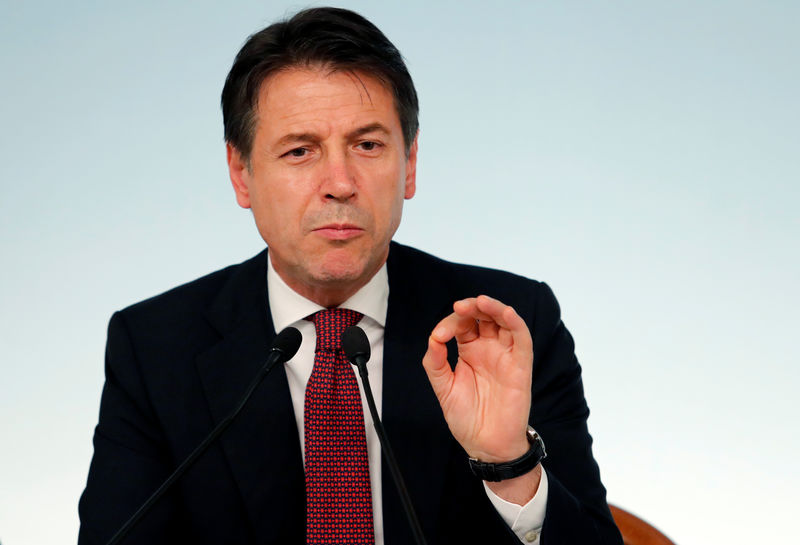BRUSSELS (Reuters) - Italy's budget dispute with Brussels is set to escalate in coming weeks, after Rome decided not to revise its free-spending plans despite European Union warnings that its budget is in breach of EU fiscal rules.
The European Commission could begin disciplinary proceedings as early as next week. The process could eventually lead to fines, a freeze of EU funds and to EU monitoring of Italy's issuance of new sovereign bonds.
The opening of what is called an excessive deficit procedure would be the first step in a long legal dispute that is likely to increase market pressure on Italy until it is resolved.
In October the Commission, in an unprecedented move, asked Italy to revise its draft budget for next year, saying the plan violated EU rules as it was likely to fail to decrease the country's huge pile of public debt.
Rome has a debt of more than 130 percent of gross domestic product (GDP). Euro zone states have repeatedly supported the Commission's stance.
Despite the EU warnings and market turmoil that increased Rome's debt servicing costs, Italy's eurosceptic government stuck to its plan to increase its budget deficit to 2.4 percent of GDP next year and raise its structural deficit too.
It confirmed this line in a letter sent to the Commission on Nov. 13, offering only a pledge to sell more public assets if the deficit went above the 2.4 percent target.
Rome said its debt would fall because Italy would grow faster thanks to more spending, and made no concessions on the structural deficit which is to rise 0.8 percent of GDP next year, instead of falling 0.6 percent as required by EU rules.
Below the possible next steps:
Nov. 21: The Commission could decide to adopt a report saying Italy is in breach of EU fiscal rules because of its high debt. It is currently assessing whether relevant factors, including Italy's debt in the long term, can be taken into account to justify the fiscal deviation.
Nov. 26-30: If the Commission adopts its debt report on Italy on Nov. 21, euro zone envoys could decide this week to endorse it. They would have until Dec. 5 to do so.
After euro zone envoys back the debt report, the Commission could at any time recommend the formal opening of a disciplinary procedure. This could in principle happen already this week, but the Commission could also take more time to prepare its recommendation.
Dec. 3: Euro zone finance ministers meet for a regular monthly meeting in which they are likely to step up their pressure on Rome.
If the Commission has already made its recommendation to open disciplinary proceedings against Italy, euro zone ministers could decide whether to endorse the recommendation at this meeting. This would be the formal start of a disciplinary procedure.
Dec. 13-14: EU leaders meet for their regular end-of-the-year summit in Brussels and will probably express criticism against Italy's budget moves, but this would play no part in the formal disciplinary process.
Jan. 21: Euro zone finance ministers meet for their first regular monthly meeting of the year. If they have not already decided on a disciplinary procedure at their December meeting, they could take the decision at this meeting.
Italy could be required to correct its excessive deviation from fiscal targets within three months from the launch of a disciplinary procedure. A failure to act could trigger sanctions, which have so far never been imposed on any euro zone country.
The decision on possible sanctions is likely to take into account the political impact it could have ahead of a European parliamentary election in May.
May 23-26: European Parliament election. EU officials have said that if sanctions decisions are not made before the election, they could be shelved indefinitely.
POSSIBLE SANCTIONS
As a precautionary measure, Brussels could ask Italy to set aside a non-interest bearing deposit of 0.2 percent of its GDP. This decision could be made within 20 days from the formal opening of a disciplinary procedure, which could happen as early as Dec. 3 if the Commission and euro zone states decided to move very quickly against Italy.
Once the procedure is opened, the Commission could also set a deadline as early as March for Italy to take action to reduce its debt.
Missing that deadline could trigger harsher sanctions, including an actual fine of up to 0.2 percent of GDP, the suspension of billions of euros in EU funds and closer fiscal monitoring by the European Commission and the European Central Bank, involving missions in Italy similar to those in bailed-out countries like Greece.
If it continued to fail to cooperate, Rome could face even stricter penalties under EU rules. They might include a fine of up to 0.5 percent of GDP, a cut of multi-billion-euro loans from the European Investment Bank of which Italy was the EU's largest beneficiary last year, and EU precautionary monitoring over Italy's plans to issue new debt.
